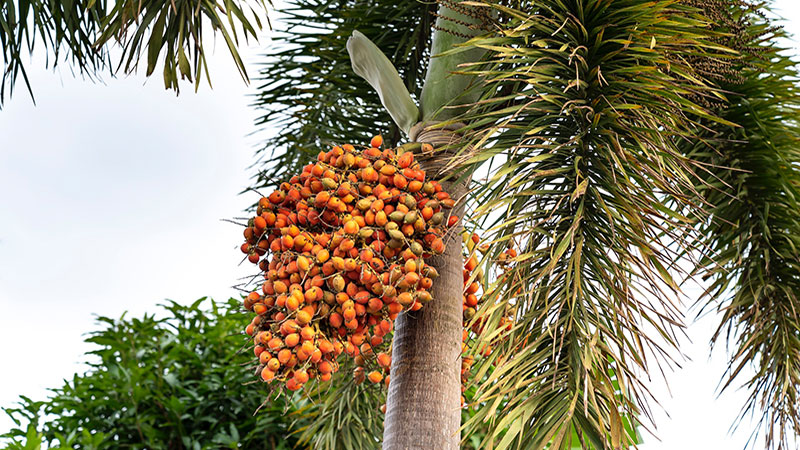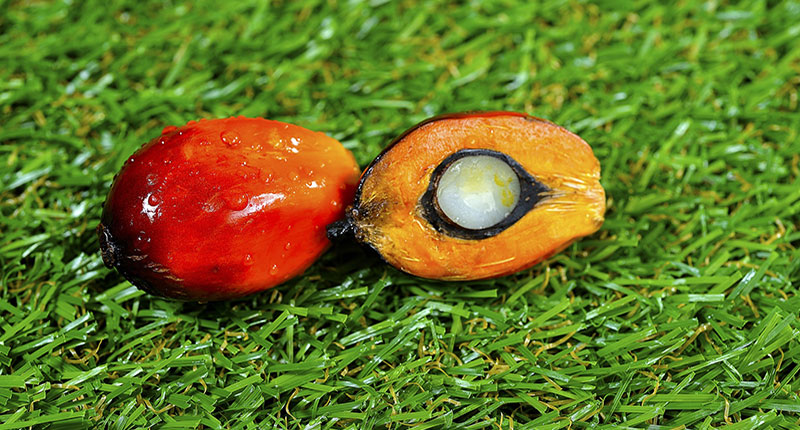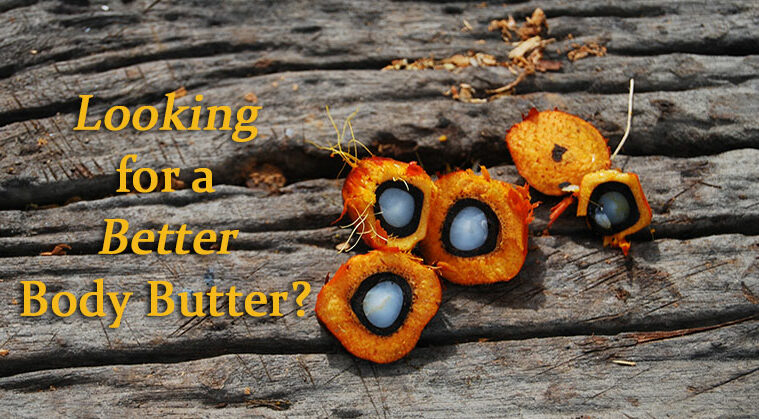Looking for a better body butter? Sure, there’s a plethora of options from the skincare industry when it comes to lathering the skin with rejuvenating lotions. But the question becomes – does Nature offer us better options, and is there a natural body butter that’s best?
Fortunately, Nature does provide alternatives. But which is the better body butter for you? Are there natural choices you can make that will protect, nourish, support, and even repair damaged skin and hair?
Find the answers here. Discover below three quintessential oils from the palm tree family that every health advocate should know about to glow from the outside in!
Is a Better Body Butter in Your Future?

Babassu Oil
This tropical fat serves as a wonderful coconut oil substitute in both consistency and texture. Coming from the Amazonian jungle, the seeds of the Babassu Palm Tree (Attalea speciosa) produce an edible oil that has many uses. The leaves, roots and fruits all contain medicinal aspects, but it is the oil that shines the brightest with its hydrating and anti-inflammatory properties. (1)
But we’re talking about a better body butter, with topical applications. So also like coconut oil, babassu oil is solid at room temperature with a high fat content (70%). This rich source of lauric and myristic fatty acids makes babassu a go-to for moisturizing the skin and hair. (2)
These fatty acids also provide a natural source of a viable antibacterial and for cancer cell death. (3)
In some ways, it is unlike coconut oil, in that it is very light and not greasy, and it can add volumes to one’s dry or flaky hair without having to risk acne formation. (4)
One feature cannot be denied. Babassu oil is extremely rich in antioxidants, including tocopherols (vitamin E), to repair and soothe the skin or scalp. (5)
These antioxidants also allow for the pollution-related, free-radical blocking capabilities that babassu oil is known for. (6)
Tucuma Butter
Another Amazonian rainforest beautifier goes by the name Tucuma Palm Tree – with two species to choose from: Astrocaryum vulgare and Astrocaryum tucuma. The latter contains a larger fruit and flesh size, while the former boasts more fiber and sweetness. Both, however, are famed for their unique ability to grow new shoots after a fire! (7)
With tucuma you can get either a butter or an oil. The oil comes from the orange-colored pulp of the fruit itself, offering amazing skin-rejuvenating properties. The butter, on the other hand, is exclusively taken from the white “almond” oily seed.
While you may want just the butter, make sure you don’t throw out the pulp or peel! Why? They are an excellent source of the antioxidant beta-carotene (180 to 330 milligrams/100g oil). In comparison, carrots only have 6.6mg/100 pulp. But it doesn’t stop there! Rich in vitamin E, a high profile of Omega 3, 6, and 9 essential fatty acids, as well as the cancer-fighting quercetin all make this butter a game changer. (8)
Plus, if your scalp is really struggling from dryness or hyperpigmentation, then this cold-pressed butter is for you! This palm bean both nourishes and hydrates the epidermal layer of the skin. It also protects the hair follicles by giving them a gentle coat adding a vibrant elasticity and buoyancy which affords a sheen that will be hard to hide. (9)
You can use tucuma in different ways. Because it spreads easily, tucuma adds suppleness to the skin and works as a powerful softening agent, too! Who knew this better body butter could do so much? (10)

Murumuru Butter – “Vegetable Silicone”
Closely related cousin to Tucuma is the equally popular Murumuru butter (Astrocaryum murumuru). This better body butter is extracted from the yellow-colored fat of the encased nut. Scientific analysis of its lipid profile shows it to be a suitable alternative to cacao butter with a melting point of 33 degrees Celsius. Yay, for all you chocolate connoisseurs! (11)
Being rich in the lauric (47%) and myristic fatty acids, it provides an excellent barrier for the skin and prevents moisture loss. To retain the most moisture, be sure to apply right after you slip out of the shower. It works wonders for the lips, too. Says board certified dermatologist, Dr. Marisa Garshick:
“It may be especially effective when used with a humectant such as hyaluronic acid or glycerin, as these help to draw moisture in, and murumuru can help to keep that moisture in place.” (12)
If you find that coconut oil too heavy for the skin, murumuru could be your knight in shining armor! It turns out to be less comedogenic (pore-clogging) than your typical vegetable fats, and so it has less likelihood of causing acne breakouts. (13)
Murumuru can be worked wonderfully into hair care lotions, as its strong emollient properties serve to soften frizzy hair, restore elasticity, and give the hair shaft a lustrous glow. (14)
Furthermore, this amazingly versatile oil comes with the benefits of being anti-inflammatory. It contains the compound lupeol cinnamate, making it a remedy for soreness or swelling on the face. Or say bye-bye to your post-partum stretch marks, and hello to soft, supple skin! (15)


